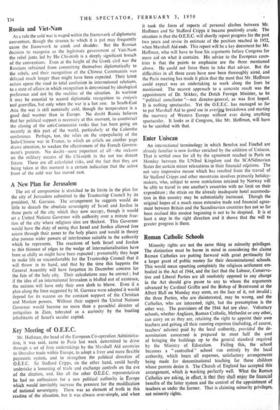A New Plan for Jerusalem
The art of compromise is stretched to its limits in the plan for the city of Jerusalem submitted to the Trusteeship Council by its president, M. Garreau. The arrangement he suggests would do little to disturb the absolute sovereignty of Israel and Jordan in those parts of the city which they now occupy, though it would set a United Nations Governor with authority over a minute frac- tion of the city where religious sites are thickest. This Governor would have the duty of seeing that Israel and Jordan allowed free access through their zones to the holy places and would in theory also possess wider powers of interference suitable to the authority which he represents. The reactions of both Israel and Jordan to this thinnest of edges to the wedge of internationalisation have been as chilly as might have been expected ; presumably they hope to make life so uncomfortable for the Trusteeship Council that it will throw in its hand, and that by the time this happens the General Assembly will have forgotten its December concern for the fate of the holy city. Their calculations may be correct ; but if the idea of an international Jerusalem is bluffed out of existence, the nations will have only their own sloth to blame. Even if a plan along the lines suggested by M. Garreau were adopted it would depend for its success on the constant support of the Christian and Moslem powers. Without their support the United Nations Governor would become no more than a parochial director of antiquities in Zion, tolerated as a curiosity by the bustling inhabitants of Israel's secular capital.


































 Previous page
Previous page